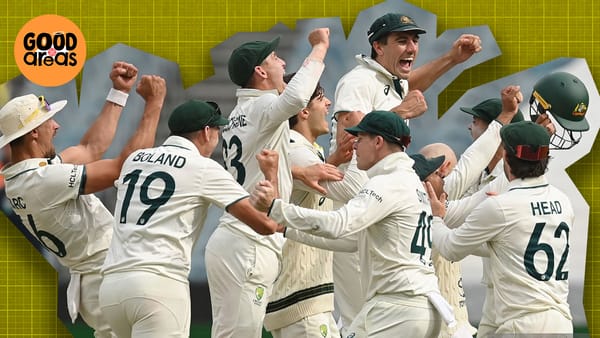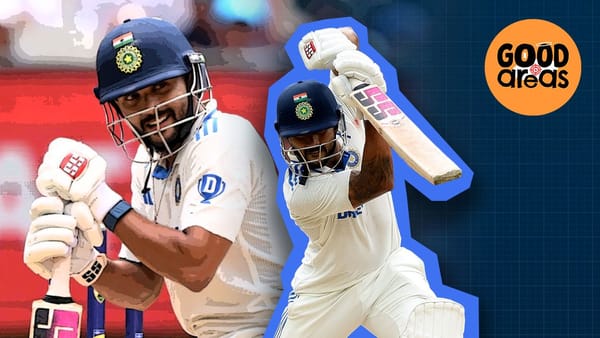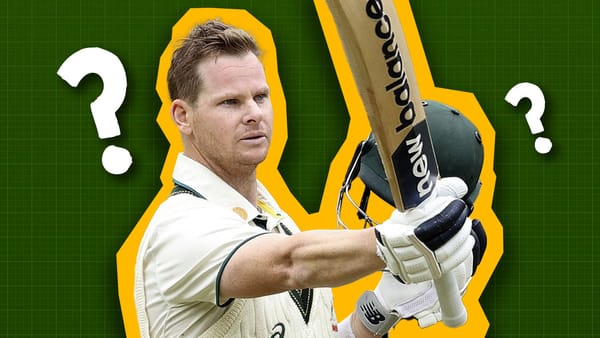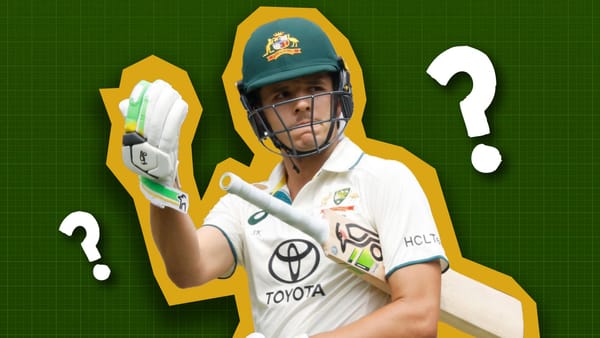A seven-game narrative
For once I was not part of the game or coverage, and so I followed the games and the coverage like it was a sport.
When I watch sport this closely, I'm part of it. Either working with a team, commentating or writing. But for a second-round matchup between Denver Nuggets and the LA Clippers, I was just an observer. And I found the coverage just as fascinating as the seven-game series.
This matchup wasn't supposed to be a big deal. The Clippers were the favourites for this, and often to win the entire championship, and the Nuggets are a hipster team. You like them cause they're quirky. But it's also important to note that Denver is a flyover state, the Nuggets have never one a championship they have never even made it to the finals.
The LA Clippers might be from a bigger city, but they're the Clippers, in a town famous for the Lakers. They haven't won a title, or played in the finals and were mostly famous for being the worst team in basketball. Oh, and the fact their old owner hated black people.
Now clearly these two teams are better than they've been. Denver has built up an incredibly young group and the Clippers have perhaps the best player in the League with his mate, who's also one of the best players in the league—turning a poor team into a title favourite.
ESPN had 19 analysts and writers pick who would win this series, and not only did all of them pick the Clippers, not one even suggested that the Nuggets would take it to a last game. I found one analyst in Matt Moore from Action network who was the only national journalist that seemed to pick the Nuggets, and even he works on a Nuggets podcast.
And this is where I thought the entire series got interesting because I had to pull together my coverage from everywhere. I follow the NBA as an overall league, the guys who cover all the trends, either analytics or general writers, and tell me where I need to put my attention. With a few Nugget specialists in there. But that doesn't do for the playoffs; you need to see everything. Well, I do. So I've been picking as many people as I can. First I had to add some Clipper beat writers, so I could hear the other side. Then I collected Nugget writers, podcasters, superfans, anything really. And anyone who was paying particular attention to this series, so at the start, not that many, and eventually everyone.
As a sports writer who has studied the industry I kinda knew coming in that no one knows everything. The national people have the best context, and they've seen a bit of both teams and everyone else. They also understand the trends. But they usually have a preference towards the bigger teams. So Philadelphia and Miami get a lot of coverage, but Toronto and Oklahoma City get less. The local journalists are incredible, but if you're a Nuggets writer, you have seen the Clippers only four times in the year. And when you watch the same team repeatedly, your view of everything else becomes warped.
But through all this it was pretty clear that there was a strong narrative from each game that had a consensus. This isn't to say other opinions don't exist, but what I was looking for was the hive mind of the basketball press.
The sporting narrative is one of the best and worst things about sport. It's lazy, but it adds story and drama. It's often wrong, but when it's proven wrong, it's even better.
This is what I noticed from the coverage of this series.
Game one - Nuggets 97, Clippers 120
The narrative before and after game one was that Denver were tired.
"We play Thursday?!"
— SportsCenter (@SportsCenter) 4:14 AM ∙ Sep 2, 2020
@BeMore27 was pretty bummed when @notthefakeSVP told him the Nuggets play again in two days 😂
This is Jamal Murray, Denver's star who had just played one of the great playoff series of all time, being told that he doesn't get two days rest between series. Shockingly the player and team who were tired lost easily. Denver rested their better players very early on, almost conceding the game, because it was clear they were that tired.
As someone who's worked in professional sports, I don't think scheduling is talked about enough. I've been with teams that have won or lost based on little more than what happened the few days before. The Clippers beat the Dallas Mavericks in six games, meaning one less game than the Nuggets, and had two extra days of rest. They also didn't have to push their stars as much, as it was an easier series for them, where the Nuggets had to come from being 1-3 down.
NARRATIVE: The better team essentially got a bye.
Game two - Nuggets 110, Clippers 101
Part of this narrative was that Denver wasn't tired anymore. While that was true, it was also clear that the reason the Clippers were now a contender, Kawhi Leonard, only scored 14 points. Being that the Nuggets had no obvious weapons to guard him with, and he'd basically done as he pleased in the first game, that could have been the narrative.
Instead, it felt like most people just thought Denver caught the Clippers napping a bit, as they were so bad in the first game. And they were. It's not that this win didn't count; it's just that it didn't change how anyone saw this series. The Clippers were still the better team, and they'd let Denver win.
NARRATIVE: The Clippers would wake up.
Game three - Clippers 113, Denver 107
This was a match that Denver was in right up until the end. And then the Clippers flipped a switch. That is what I heard. It's not entirely untrue, Denver were leading going into the last quarter, they were playing good basketball, and then the Clippers went past them at the end and took the game.
That narrative is simple to make, as everyone believes the Clippers are better than the Nuggets. You either believe that the Nuggets are a hipster team with a quirky superstar, or they're a young team a while away from blooming. While they put together this Clippers team to win a finals this year. Not only do they have the two of the best starters in the NBA, they also have two of the best bench players.
And when one of your players can block a shot using only one of his fingers, I mean, how can some plucky Canadian and Serbian led team have any hope.
So with the favourites up, the narrative was safe, and while some writers hinted at the fact that Denver could have won that game if they hadn't hit only seven of 22 shots in the final quarter. Including one of nine three-point attempts. It meant their shooting was dire, and if they'd shot normally, or even just slightly less horrifically, they'd have probably won the game. But you had to really squint to see this through all the talk of how the Clippers were better.
NARRATIVE: When the Clippers flip a switch it's over.
Game four - Clippers 96, Nuggets 85
This was a low scoring game, and the Clippers are an incredible defensive team. They lead the entire game. Keeping a team like the Nuggets to only 85 points was huge, and it led to their young star, Michael Porter Junior (who I've written about a lot) saying "I just didn't touch the ball. They didn't do anything differently."
This was about the fact that Porter didn't score a point in the second half on only two shots (one from his own rebound). This became the newsy angle. But it was also used to show the Nugget's coach was out of touch on offence, and that the Clippers had only to beat the two Nugget stars and they were going to their first Western Conference final ever.
One thing that wasn't talked about much this series was that an enormous advantage the Nuggets usually have is that teams have to come to Denver. Meaning they have to play in high altitude. I can't even sleep right in Johannesburg, so how athletes play in high altitude after being in normal altitude the night before I have no idea. Nuggets won 70% of their home games this year. So them being in Disney, with no altitude adjustment, against a team who now lead 6-2 against them over the year, meaning this looked over.
The Nuggets had come back from 1-3 in the previous playoff round, but the Clippers were better, and the Nuggets more tired. I wondered at this point if the fact the Clippers had also been kept to only 96 against a Denver team who spent all year with an offensive rating of 113, might also see some goodness in their defensive effort. But who cared as it was 3-1.
NARRATIVE: The Clippers were better.
Game five - Nuggets 111, Clippers 105
Dead cat bounce with a hope of another epic Nuggets comeback was the story for this game. There were some suggestions that the miserable history of the Clippers was now an issue.
The Clippers' history has just checked in for Denver.
— John Hollinger (@johnhollinger) 12:54 AM ∙ Sep 12, 2020
But no one really believed this, and that's because no one actually believed Nuggets were better than the Clippers. Oh, and also, there was an emotional part to this. The Nuggets were getting slaughtered in this game, when Marcus Morris Snr got in Paul Millsap's face.

That is from the Associated Press report. But it was pretty widely thought had no one rattled Millsapp; the Nuggets would have continued to struggle. Now, Milsappp has been averaging less than 9 points a game in matches where he wasn't angered. And he has scored 69 points in the entire series, in that quarter he scored 14. 20% of his points in 3.5% of his overall game time.
And he kept them in the third quarter, but Denver were even better in the fourth. And it wasn't just Millsapp's scoring, they also beasted Clippers on defense. But because they were 3-1 down, and weren't expected to win, it was a veteran who had his pride pricked, rather than a good team effort.
NARRATIVE: Clippers forgot to flick switch while finding aging all star's pressure point.
Game six - Clippers 98, Nuggets 111
This was a star-studded Clipper line up. Their 15th man was Joakim Noah, a former defensive player of the year and son of Yannick Noah. Their roster wasn't just talented players, but award-winning players. It was like you couldn't be on the roster without a major honour from the NBA along the journey. And this wasn't a team that had been built together; they were still adding to through the year.
Their plan was to make sure they had the most talent, the most options, and no matter what was thrown at them they'd have something to beat it with. But it meant that this was a collection of players, not quite a team. Now, had they played all year, they could have sorted this out. But they were so sure they'd go deep in the playoffs they spent a lot of their season resting key players to be fit when they needed them. You can see the logic in it, but three of their starters are new to the team. They really needed to gel properly first. Maybe they would have, if not for the entire global pandemic thing.
This had been the narrative in January but it wasn't being talked much when they were 3-1 up, and neither was their history.
Still valid three days later.
— John Hollinger (@johnhollinger) 8:12 PM ∙ Sep 13, 2020
Not all the talk was about how the Clippers weren't as good as previously thought, although that was the dominant angle. But by now the talk was finally not about how good the Clippers were and were suddenly whether the Nuggets' Nikola Jokic was the second-best player in the series. Now it was about matchups, now people had seen a lot, and while the team work thing was clearly something that was affecting the Clippers, the other thing was trying to stop Jokic. Because the Clippers were perfectly set up to defeat guards and forwards, they are built to out muscle small ball players. Because that's what most teams have. And then a seven-foot trickster who plays like no other player ever in the NBA comes up against them, and it all falls apart.
NARRATIVE: Wait, what, a Joker in the pack?

Game 7 - Nuggets 104, Clippers 89
The ESPN commentary essentially finished with a line saying that the better team won. When that happens, I often think, let's say Denver played just as good, but Jokic fouled out, or Jamal Murray rolled his ankle in the 2nd quarter and they lose. Are they still the better team? I am not sure they are the better team now. They won, they exposed a match up flaw, played better defense than they had all year and the Clippers couldn't handle it.
NARRATIVE: The Nuggets are the best team. We have always been at war with Eastasia.
The thing is. I think with how big the sports industry is, how specialised so many people are, and how much weight the result carries, I am not sure any of this was wrong. It's just that as often happens, sports narrative is never right. The series was quite the wild ride; so was the coverage.




